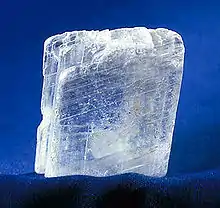selenite
English

Selenite (1)
Etymology
From Ancient Greek σελήνη (selḗnē, “moon”) + -ite; the chemistry sense comes via the name of the element selenium.
Noun
selenite (countable and uncountable, plural selenites)
- (mineralogy) A soft, glassy form of gypsum (chemical formula CaSO4·2H2O).
- (inorganic chemistry) The anion SeO32− derived from selenous acid; any salt or ester of selenous acid.
Synonyms
- satin spar (1)
Derived terms
- cadmium selenite
- sodium selenite
Translations
gypsum
Further reading
- “Selenite” in David Barthelmy, Webmineral Mineralogy Database, 1997–.
- “selenite”, in Mindat.org, Hudson Institute of Mineralogy, accessed 29 August 2016.
Italian
Etymology
From Latin selēnītēs, from Ancient Greek σεληνῑ́της (selēnī́tēs, “moonstone”), derived from σελήνη (selḗnē, “moon”).
Pronunciation
- IPA(key): /se.leˈni.te/, [s̪el̺eˈn̺iːt̪e]
- Stress: selenìte
- Hyphenation: se‧le‧ni‧te
Noun
selenite f (plural seleniti)
- (mineralogy, obsolete) moonstone
- Synonym: pietra di luna
- (mineralogy) selenite
This article is issued from Wiktionary. The text is licensed under Creative Commons - Attribution - Sharealike. Additional terms may apply for the media files.